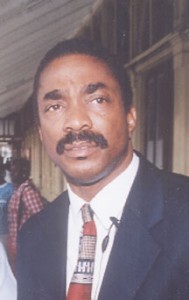Matters got heated in parliament on Thursday when members of the PNCR-1G labelled the debate on two bills dealing with visiting forces a farce and refused to debate the last bill leading one PPP/C member to call them “lazy”.
In the end the two bills, the Visiting Police Forces and the Visiting Forces Bill were passed in the National Assembly.
The two bills, which were originally part of the sunset legislation enacted specifically for Cricket World Cup, 2007 were originally supported by the PNCR-1G but that party later objected to a few clauses when it was indicated that the ruling party wanted to make them permanent. The acts were assented to but expired on June 30 last year.

At the end of a lengthy debate of the first bill to be read, the Visiting Forces Bill, Home Affairs Minister Clement Rohee indicated that he was not going to entertain the idea of the bill being sent to a select committee as requested by the main opposition, and they were going to be passed.
This did not go down well with PNCR-1G MP Debra Backer and when she rose to debate the second bill after the first was passed, said that her party no longer wanted to have any engagement in what she described as a “farce” and then took her seat.
However, she was not to be let off so easily by PPP/C MP Gail Teixeira who said that the two bills could not be dubbed a farce as they were tabled in June. She described the refusal of the PNCR-1G to take part in any further debate as being a “very lazy and convenient argument” for them not to fulfill their responsibilities as parliamentarians. She said that the party cannot wait until they attend parliament to take such actions, and she described this as “mamaguying” (Trinidad dialect for deception) the public.
Leader of the PNCR-1G, Robert Corbin, said he was forced to rebut Teixeira’s statements pointing out that he did not see why the bills could not be sent to a select committee as they requested. He said that no time would be lost if that was done. He said further that he resented Teixeira’s suggestion that they were being negligent in their responsibilities.
In his argument to support the first bill, Minister Rohee in response to concerns raised by Williams said that there was no way troops outside of the Caribbean were going to be brought into Guyana under the bill. Williams had suggested that maybe Guyanese could wake up and find Russian or German troops on its streets maintaining law and order. Rohee said he had asked the Guyana Defence Force (GDF) to report what were some of the experiences they had gained from their deployment in other countries during the World Cup and one of the things they reported was the fact that it brought about a level of cooperation among the armies throughout the region. They reported that there was a better understanding of the parameters under which troops can operate in different countries. The army said its officers accumulated a wealth of experience during that period and they indicated their willingness to build on it.
But the GDF has some of its own problems, according to Williams who said members of the army have been accused of torturing citizens and even some of their own members and up to now there has been no report into the allegations. He said while the army under the Defence Act, Chapter 15:01 has the power to maintain internal order they have purportedly arrested citizens.
The provisions of both of the bills were found to be useful and during the 13th Special Meeting of CARICOM heads of governments held in Trinidad in April this year it was favoured. As a result government proposed that the bills be enacted so as to provide an enabling law for the presence, activities, privileges and immunities of police forces of foreign countries and certain personnel accompanying the forces as a civilian component. This also applies to members of the forces and their dependants.
The Visiting Forces Bill provides for civil courts in Guyana or service courts of visiting forces to have primary rights to exercise jurisdiction over members of visiting forces and their dependants in different circumstances. Visiting members are also allowed to possess and carry explosives, ammunition and firearms. Also the act restricts proceedings relating to the service of members of visiting forces and grants members of visiting forces immunity from civil and criminal proceedings in respect of actions taken by them in the course of their duties. Members are also exempted from certain taxes and duties (including import duties and income tax).
No coroner’s inquest can be held if the deceased person has a relevant connection with a visiting force.
Under the Visiting Police Forces bill the visiting police officers also have immunity from civil and criminal proceedings in Guyana and the civil court or a service court in the country of the visiting officers, and the right to deal with charges against the offenders in the first instance. However, the right could be waived by the Minister of Home Affairs by order.






